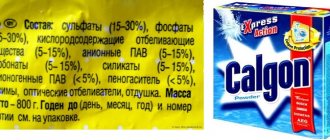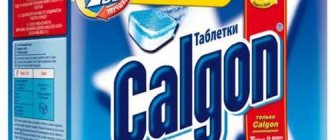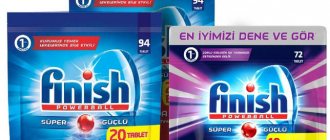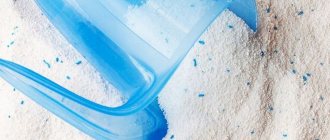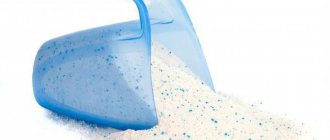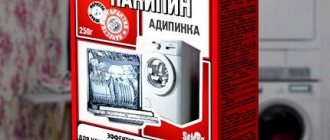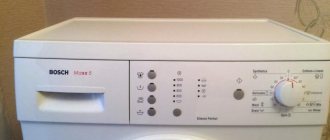Hi all!
The other day I found myself embroiled in an interesting argument with some old friends about whether it is necessary to add a product to the washing machine to prevent the formation of limescale in it. Since one of my friends is a philologist, and the second is a translator, that is, people quite far from chemistry, they turned to me to help resolve this dispute.
This is how this article appeared.
I myself became very interested in figuring out how to do it right. I just decided for myself a long time ago not to add any products to the washing machine, since they are all, to one degree or another, part of the washing powder.
At first, when we just bought a washing machine (and this was back in the spring of 2004!), I diligently bought Calgon and added it to each wash. Then I found information that modern washing powders already contain substances that prevent the formation of scale, that the composition of Calgon in this regard is not so different from them, and I stopped bothering about it. And now this question has come up again.
By the way, over the past 12 years after purchase, we have repaired our washing machine only once - last year, we changed the shock absorbers. That is, the breakdown has nothing to do with scale and other similar things. The technician who fixed the problem said that our Samsung Bio-Compact would work quietly for another ten years.
For those who are interested in why our washing machine is so “fishy”, read this article
Who produces?
The Calgon trademark belongs to the large company Reckitt Benckiser. This company was founded in 1814 in England by entrepreneur Derek Colman. The company was originally called Colman's and was engaged in the production of flour and mustard. In 1840 the company acquired a starch mill and was renamed Reckitt & Sons. Somewhat later, the company’s plant began producing polishing and washing products.
In 1823, the company's management founded a business in Germany producing exclusively cleaning products and various household goods. In the same year, the company for the first time began supplying the market with Calgon, intended for water softening. The composition of this softener was developed by the company’s specialists and remains virtually unchanged to this day.
In 1999, the company merged with the German company Benckiser NV. As a result, a new manufacturer of household chemicals, Reckitt Benckiser, appeared on the market. By this time (since 1994), the company already had an office, including in Moscow.
The main benefits of "Calgon"
The mechanism of scale formation on heating elements is quite simple. When water is heated to a temperature above 60 C, the salts it contains begin to settle on the metal parts of the machine. Over time, the layer of such deposits becomes thicker. The most common causes of such problems are magnesium and calcium particles.
Scale, which has low thermal conductivity, forms a kind of insulating layer between the hot heating element and cold water. As a result, the machine begins to consume much more electricity to heat water. And the heating element itself constantly works with overloads, which ultimately leads to its breakdown.
Why does scale appear?
On washing machines that have been in operation for a couple of years, you can notice particles of dirt that cannot be removed with a cloth from plastic and metal surfaces.
There are several reasons for the formation of such crystallized plaque:
- For two or three years of operation of the unit, no preventive maintenance was carried out;
- The washing
used has a high content of chemical impurities; - The machine
often washes in high temperature and fast modes; - The water in the water metering unit was often turned off;
- The water used is excessively hard or unclean. The scale on the Tubular Heater is a crust of hardened magnesium and potassium salts. After a certain time, it only increases, which leads to overheating of the heater and its burnout;
- Due to the occurrence of scale in places where the machine is difficult to reach, some of its parts quickly wear out and break.
There is a simple way to help you promptly notice a problem brewing. It is necessary to look through the hole at the bottom of the drum onto the tubular heater to assess its condition. If necessary, use a flashlight. If there is a layer of scale on the heater, it’s time to clean it.
Means "Kalgon": composition
This water softener is supplied to the market in the form of tablets, powder or gel. But in any case, the main components of Calgon are sodium tripolyphosphate and soda. This softener has had this composition, as already mentioned, from the very first day of its appearance on the market in the 50s of the last century. During the entire production of the product, only the proportions of active ingredients and types of “fragrances” have changed.
The chemical composition of calgon, therefore, looks something like this: Na2CO3 (soda) + Na₅P₃О₁₀ (sodium tripolyphosphate).
The tablets of this softener are compact in size and are supplied to the market in boxes of several pieces (12-70). The main advantage of this form is the convenience of dosage. Calgon gel is supplied in bottles mainly of 0.75, 1.5, 2 liters. The powder is packaged in bags and boxes.
What does it consist of?
Contrary to expectations, the composition of the powder is not that complicated. It contains only a few main components.
- Polyethylene glycol in a proportion of less than 5%.
- Microcrystalline cellulose in a proportion of 5 to 15%.
- Polycarboxylates make up from 15 to 30% of the total mass of the substance.
The remaining half of the product is formed by ordinary sodium tripolyphosphates and... soda! Some element names don't sound very friendly, but don't worry
The composition of Calgon is completely harmless to human health if used as intended and precautions are taken. For example, be careful not to get the powder in your eyes or inside your body.
In the first case, rinse your eyes thoroughly with water. In the second, you need to drink as much water as possible and seek help from a specialist.
The rest of the precautions are familiar to every housewife: pour in a measuring spoon to avoid overdose, store out of the reach of children and away from sunny things. Also, in order to avoid unpleasant situations, it is better to keep the powder away from any food products.
Recommendations for using Calgon are in the instructions; it must be added to the machine in the required quantities when washing.
What are the benefits of using Calgon according to the manufacturer?
In addition to preventing the appearance of scale, Reckitt Benckiser recommends using this softener:
- to reduce the amount of washing powder used;
- to improve the quality of washing the laundry itself.
In soft water, washing powder is known to foam and wash things much better than in hard water. Also, according to the manufacturer, when using Calgon, scale does not settle not only on the heating element, but also on the laundry itself. As a result, a gray coating does not form on things, spoiling their appearance.
Instructions for use from the manufacturer
The composition of calgon for the washing machine is designed in such a way that this product should be used when washing in the following dosages:
- for hard water - 64 ml;
- for water of medium hardness - 32 ml;
- for very hard water - 96 ml.
The manufacturer does not recommend exceeding the dosage of the product. This may adversely affect the internal parts of the machine. Calgon powder has almost the same composition as tablets. Dosages when using this form of softener are determined using a measuring cup.
The manufacturer recommends pouring Calgon along with washing powder into the main compartment of the machine. It should not be added directly to the water in the drum. This may result in damage to machine parts. The manufacturer recommends using Calgon with every wash. Irregular use, according to experts from Reckitt Benckiser, can have a negative effect on the machine.
Price
The assortment is not great.
Under the name Kcalgon they produce powder, gel and tablets for washing. Each of them is the same in composition, but different in shape. More details about each. Product cost
| Gel | Powder | Pills | |||||
| Manufacturer | Italy | Russia | Italy | ||||
| Storage | 2 years | 2 years | 2 years | ||||
| Net weight | 750 ml | 1500 ml | 550 g | 1100 g | 1600 g | 12 pcs | 35 pcs |
| Cost from | 300 rub | 500 rub | 300 rub | 500 rub | 700 rub | 300 rub | 700 rub |
As you can see from the table, the cost of a product depends on the volume (weight), but not on the manufacturer. The price ranges from 300 to 800 rubles. But what kind of product to choose - gel or powder - is decided by the hostess herself.
Reviews from service center employees
Unfortunately, craftsmen involved in repairing washing machines do not have a very good opinion about the Calgon product. Employees of service centers believe that equipment in which this softener was used during washing breaks down more often than equipment in which it was not used.
Most craftsmen, therefore, do not advise housewives to use Calgon for washing machines (the composition of the product, in their opinion, is even harmful to metal parts). Almost all modern powders already contain water softening components. And, according to service workers, they are quite enough to keep the heating elements clean. The use of Calgon by housewives, even if the manufacturer’s instructions are strictly followed, leads to the appearance of a certain viscous substance on the heating elements. It is this, according to service workers, that leads to equipment failure.
What do washing machine manufacturers advise?
Specialists from companies producing such household appliances recommend using softeners in combination with washing powders. However, they advise not to do this too often. In order to bring benefit and not harm to the heating element of the machine, such products, in their opinion, should be used no more than once every 1-2 months. And, according to experts, this should only be done if machine washing is done at temperatures above 60 C.
Manufacturers of these household appliances recommend doing preventive cleaning of the metal parts of the washing machine at least once every six months.
Regarding Calgon itself, leading companies, unfortunately, have never spoken specifically. However, such manufacturers usually advise purchasing products containing acid to clean the heating elements of washing machines. Unfortunately, Calgon does not contain such substances.
Reviews from housewives
Consumers themselves have a mixed opinion about Calgon. Some housewives believe that this softener really works and protects the machine from damage. Many consumers even note the fact that this product, oddly enough, helps get rid of the smell in the drum very well. And “Calgon” itself, judging by the reviews, smells quite pleasant and unobtrusive.
Reviews about this product, therefore, are also positive. However, in most cases, housewives are somewhat skeptical about this softener. This is due primarily to its simple composition and at the same time very high cost.
The price for a standard 1.1 kg pack of Calgona is about 400 rubles. This amount of softener only lasts for a month. Many housewives therefore advise replacing Calgon with simpler and cheaper home or industrial products that also cope well with scale. Among other things, some consumers note the fact that this softener caused them an allergic reaction.
Where to pour washing gel in a vertical machine?
A front-facing washing machine has a tray at the top. As a rule, it is located directly above the door or on the side. If the unit is vertically oriented, then the tray is in most cases located on the inside of the lid.
Interesting materials:
What does growth hormone do? What is the government doing to develop small businesses? What does Game Mode do in Windows 10? What does the Mist Map do? What does chondroitin do? What does an artist designer do? What does Clomid do? What does a computer worm do? What does Cosmetician do? What does creatine do to muscles?
Industrial analogues
The description of “Kalgon” (composition, reviews, recommendations), therefore, was given in the article in sufficient detail. According to housewives, this remedy can be quite helpful in some cases against scale when used correctly. But since this softener is expensive, if desired, as already mentioned, it can be replaced with some cheap analogue. For example, many housewives use Alphagon to protect their washing machine. When using this cheap softener, as the manufacturer claims, powder consumption is halved. 500 grams of this product costs only about 65-70 rubles.
Homemade analogues
In addition to purchased industrial products, they work well against scale in washing machines:
- Lemon acid. 2-3 tablespoons of this product should be added to the water in the drum and a wash cycle should be carried out at a temperature of 90 C. This cleaning is carried out once a year.
- Vinegar. It is recommended to use this product to clean the elements of the washing machine from scale once every three months.
We found out above what is included in Kalgon. One of the ingredients of this product is regular soda. Of course, this substance can also be used to clean the metal parts of the machine. Washing soda softens water very well. And many housewives recommend using it with every wash.
conclusions
Summing up, we can conclude that Kalgon products are not so necessary. Reviews from consumers and professionals in the repair and production of washing machines indicate that the product not only does not cope with the task, but also has a negative impact on the quality of some important rubber parts of the machine. In any case, only you can make the final choice. It's up to you to decide who to believe - the words of manufacturers interested in increasing sales and providing all sorts of certificates supposedly guaranteeing quality, or, perhaps, the comments of real people who have used the product for a long time and can objectively judge its properties and talk about costs that were not justified. .
In any case, with or without Calgon, you need to take care of your washing machine and use it correctly. Before you start washing, check if there are any small parts in your clothing pockets that could slip through the drum and damage the “insides” of the machine. Pay attention to water hardness; if the level is much higher than normal, appropriate measures may need to be taken. And of course, it is important to choose the right washing mode. It is not at all necessary for things to spin in boiling water; average temperatures are enough for everything to be washed efficiently.
